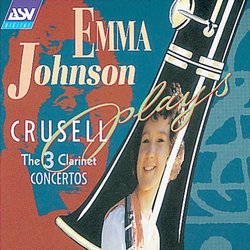| All Artists: Crusell, Schwarz, Rpo, Eco, Emma Johnson Title: Clarinet Concerti 1-3 Members Wishing: 0 Total Copies: 0 Label: Asv Living Era Release Date: 12/17/1993 Genre: Classical Styles: Forms & Genres, Concertos, Historical Periods, Classical (c.1770-1830), Instruments, Reeds & Winds Number of Discs: 1 SwapaCD Credits: 1 UPCs: 743625078428, 5011975078425, 074362507842 |
Search - Crusell, Schwarz, Rpo :: Clarinet Concerti 1-3
CD Details |
CD ReviewsHighly romanticized accounts with exhibitionist playing Larry VanDeSande | Mason, Michigan United States | 12/01/2005 (4 out of 5 stars) "Here are Emma Johnson's recordings of the three clarinet concertos by Henrik Crusell, all recorded with different conductors and at different times throughout the mid-1980s to 1991. Briefly stated, these are romantic conceptions of music by a composer that was essentially Beethoven's peer.
The pearl of this CD is the recording of Crusell's Concerto No. 2 in F minor. Here, Johnson and conductor Charles Groves are of single mind in their pursuit of romance and virtuosity. Indeed, Johnson launches into a lengthy and very individual cadenza in the latter sequence of the first movement I have never before heard in a recording of this music. Groves supports the exhibitionism of the soloist with highly charged orchestral backup where he dots the rhythm with clearly enunciated timpani beats. A lovely second movement reminiscent of Mozart is followed by the most flexible solo phrasing I have heard in the Rondo that concludes the concerto. This is certainly the most individual recording of this music I have heard and the most romantic, too. Johnson and conductor Gerard Schwarz follow a similar pattern in the Concerto No. 3. However, Johnson's initial lengthy solo run in the first movement does not have the technique or brilliance of other soloists I've heard in this music including Antony Pay and Per Billman. Her runs throughout the first movement, while highly romanticized, simply do not represent the high level of technique from competing soloists in this repertoire. Johnson launches into another highly characterized solo sequence during the development section that better shows off her technique. Schwarz supports Johnson with a high cholesterol accompaniment that makes the music try to sound more like Beethoven than Mozart...until the pair come to the second movement Andante moderato, where this music sounds as is if were written by Mozart. The finale is back to the more romantically inclined interpretation, clearly projecting Crusell as a composer that crossed over from the Classical to Romantic era. Listeners that enjoy highly charged romantic concertos will be happy with this CD, which is recorded well for its period although some orchestral detail is lost in the larger moments of orchetral tutti. Listeners more attuned to individual techinique or period performance will not find these performances very satisfying. Of the performances I have heard of this music -- by soloists Thea King, Pay, Billman and Krikku -- I have most enjoyed the work by Pay where he leads the English Chamber Orchestra, the same group that supports Johnson. Pay's view is more classically inclined and he sees Crusell more in tune with early Beethoven. The recordings of the Pay concertos also offer greater clarity in orchestral detail." |

